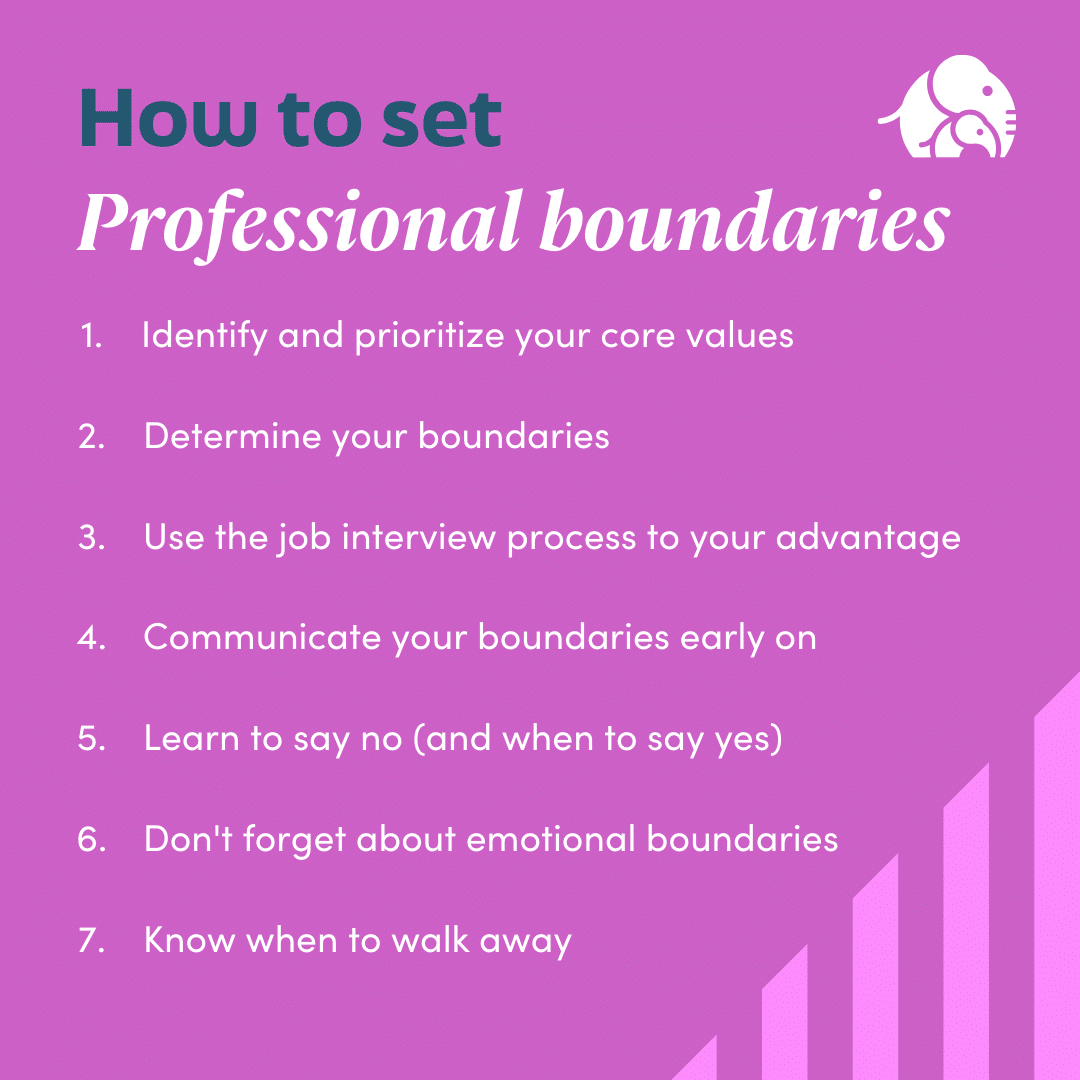In many respects, your relationship with your job is like all of your other relationships: You put some amount of effort into the relationship, and you expect (or hope) to get something in return. And just like with your other relationships, the best way to ensure a healthy relationship with your employer (or anyone) is to identify, set and maintain healthy boundaries, so you don’t end up feeling exhausted, unappreciated and resentful. Having poor boundaries is a surefire way to tank your physical and mental health. In the workplace, poor boundaries can lead to burnout.
Setting boundaries is about determining what you need from your relationships, what you will or will not tolerate in those relationships, and what actions you will take if your boundaries are not respected. It’s about ensuring you are maintaining a healthy balance between the energy you put out into the world, and what you get back in return or keep for yourself.
Figuring out what healthy boundaries look like in the workplace is an ongoing process, often involving some trial and error, and there is no one-size-fits-all rule. As you navigate your career path, you will need to craft your own set of professional boundaries, adjusting them as necessary throughout your life. Here are some suggestions to get you started on the process:
1. Identify and Prioritize Your Core Values
Setting healthy boundaries requires knowing what is most important to you – also known as your “values.” I’m not just talking about work values: I mean all of your core values, in every area of your life. What aspects of life are most important to you? If you aren’t sure what I’m talking about, there are plenty of values worksheets and lists online. But it is very hard to set healthy boundaries in any of your relationships if you don’t have a clear sense of what your priorities are. In the workplace, knowing your values can be essential when it comes to choosing the right kind of job, and it will help you establish your professional boundaries at the outset.
Once you have identified your top 8-10 values, rank them in order of importance. This can be hard to do, but it’s also essential, since you may find yourself presented with multiple opportunities, both in- and outside of work, and you won’t be able to choose all of them. Prioritizing your values will be particularly helpful when having to choose between work-related values (e.g., Achievement, Leadership, Financial Stability) and values that reflect your life outside of work, such as Family, Travel, or Religion.

2. Determine Your Boundaries
Now that you have figured out what your values are, and which ones are most important to you, it’s time to translate those into your professional boundaries. Ask yourself the following questions when deciding what your professional boundaries might look like, and consider using the values you identified earlier to help guide your answers:
- How many hours per week am I willing to work?
- How important is having time off from work? How much time off is important to me?
- What am I willing to do when it comes to requests for my time outside of my established workday/week?
- What do I need when it comes to predictability in my job? Do I need a predictable workload and steady paycheck, or am I ok with variability and last-minute changes?
- How important is flexibility when it comes to my workday? Do I need to be able to work from home, or in an office, or am I fine with a hybrid situation?
- How important are pay raises and promotions?
This is by no means a comprehensive list of questions, but it should give you an idea of what I mean when talking about workplace boundaries.
3. Use the Job Interview Process to Your Advantage
Oftentimes, we think of job interviews as the time to highlight everything that’s awesome about us, and then prospective employers get to say yes or no. But actually, the job interview process is the perfect place for you to explore the extent to which the company’s values are aligned with your own. And it is so much easier to set and maintain boundaries if you choose an employer whose values are a good match with yours.
For example, during the job interview you may want to ask about flexibility during the work day, or expectations for evenings and weekends. This is also the best time to ask about opportunities for advancement and pay raises, how flexible they are about where and when you work, and so on. If the answers don’t line up very well with your values and boundaries, you can save everyone a lot of time, money and energy by taking your job search elsewhere.
Need help setting boundaries or dealing with work stress? Try talking it through with a therapist using the link below.
4. Communicate Your Boundaries Early On
As scary as it might be, it’s almost always best to communicate some basic professional boundaries during the job interview, like how much you are willing to work, how often you are willing to put in a few extra hours, and what level of responsibility you are looking for. If taking a two-week vacation each year is important to you, let them know up front. This is also the best time to talk about where you want to work (home, office, hybrid, etc) and how often you may need to adjust your workday due to other responsibilities, and so on. Trying to dance around the truth in order to get the job, in the hopes you can talk them into adjusting their expectations later, is a good way to create frustration and resentment on both sides.
Some boundaries can be communicated after you start the job, but again, it’s still important to be open about what they are, and as soon as possible. For example, if you are getting more requests for your time than you can manage within the boundaries you have set, speak with your supervisor right away. Let them know you are struggling to get everything done within your workday, and that you are not willing to work outside your established work day/week (which, hopefully, they know already, since you said something along those lines during the job interview). Ask if they can help you figure out how to prioritize, or if there are deadlines that can be moved, or who else on your team might be able to take some projects off your plate.
5. Learn to Say No (and know when to say yes)
It can be hard to say no, especially to your boss or your colleagues. But here’s the thing: being able to say “No” is pretty much the secret sauce when it comes to setting and maintaining healthy boundaries, no matter what kind of relationship we are talking about.
When it comes to learning how to say no (or when to say yes), refer back to those values we talked about earlier. When we know what our values are, we can use those as our basis for saying yes or no, rather than what we think of as “fair,” or in reaction to what we think others want us to say. For example, if you concluded that family was your top value, and you are asked to stay late on an evening when your kid has a soccer game, then saying “no” isn’t about what you perceive as being fair or unfair, or an evaluation of whether you’re getting paid enough to stay late: Saying no is a response to Family being your top priority. On the other hand, if advancement is your top priority, and staying late could lead to advancement, then you could say yes and feel good about your answer, since saying yes was informed by your own personal values and goals.
6. Don’t Forget About Emotional Boundaries
Most of us choose our career paths for reasons that go beyond making money. A career can be an excellent way to live out some of your core values, like achievement, creativity, a sense of accomplishment, making the world a better place, and so on. But many of us try to get other needs met in the workplace as well. We’re talking about emotional needs like acceptance, admiration, a sense of belonging, feeling “good enough” in the eyes of others. Unfortunately, trying to get these kinds of needs met in the workplace can lead us to compromise our boundaries. We stay late in the hopes we receive praise from our supervisor, even though it means missing our kid’s soccer game. We go the extra mile month after month in the hopes of being praised for our dedication, even though we come home exhausted every night. We don’t speak up when we see unethical behavior on the part of our colleagues or supervisor, because we don’t want to lose their favor. We take on projects we don’t actually have time for, because we want others to like us. But as the book “Work Won’t Love You Back” discusses in detail, trying to get these emotional needs met through your job is often a losing game, leaving you feeling resentful, frustrated, hurt and burned out.
To set healthy emotional boundaries at work, ask yourself what needs and values you are hoping will get met through your job. Are they the kinds of needs and values a job is meant to fulfill, such as financial security, intellectual engagement, achievement, a sense of purpose, and so forth? Or are they purely emotional needs, like feeling appreciated, accepted, loved, or admired? If they are relational needs, you may want to talk with your therapist about other ways to get those needs met, so that you can maintain healthy boundaries at work, and to make it easier to leave your job if your workplace is asking more of you than you can reasonably give.
7. Know When To Walk Away
You’ve communicated your boundaries to your employer, and yet they continue to ask you to drop them. They frequently ask you to stay late, they give you a hard time when you use your PTO, they don’t provide a raise on the timeline they initially gave you, etc. What do you do now? Well, first you can speak with your supervisor, making them aware of the situation and asking if they are willing to adjust. But ultimately, it is up to you to maintain your boundaries, and sometimes that means quitting your current job and searching for one that is a better match (and yes, that advice is the same for your other relationships as well). Trying to change your employer, or the entire culture where you work, is about as likely to succeed as trying to change your partner. They might be able and willing to tweak a few things, but it’s unlikely they will make a complete overhaul just to fit what you need out of the relationship. If maintaining your professional boundaries is impossible to do at your current job, it is up to you to either change your boundaries, or change your job.
Learning how to set and maintain healthy boundaries is one of the best things you can do for yourself, in all areas of your life. If you need help with this, talk with your therapist. There are also plenty of books and workbooks out there to guide you through the process. It’s definitely worth the effort, as the benefits of having good boundaries will extend to all areas of your life.
Need help setting boundaries or dealing with work stress? Try talking it through with a therapist using the link below.


